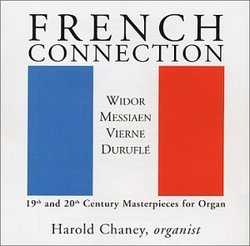Album DescriptionPopularity with high society is not a burden that musicians have routinely had to bear. But bear it Charles-Marie Widor did. His tea parties in the organ loft of Paris?s great Church de Saint-Sulpice were greatly prized by the upper class. He had a withdrawing room behind the organ where (surrounded by autographed photographs of such as King Edward VII), he entertained graciously between improvisations in the Mass. And what improvisations they must have been! His printed organ works are less spontaneous examples of his style, to be sure; but they stand as premiere examples of the French symphonic school of organ-playing, of which he was a chief exponent. And, as organ professor at the Conservatoire, he passed on his severe ideals of organ performance to a new generation. Louis Vierne was part of that generation. Vierne, who would die in the same year as Widor ? but at a much younger age ? made his mark on French music from the organ tribune of the Cathedral of Notre Dame. His style, much marked by the impressionist currents swirling through French culture, was developed in a constant stream of inspired improvisations that are the stuff of legend. He took over from Widor the organ ?symphony,? for which he is perhaps chiefly remembered. But his ?character pieces? also command respect and popularity. High among these are the 24 Pièces en style libre, which are to the organ literature what Schumann?s collections of short movements are to the piano. An extra-musical observation about Vierne begs to be made. Being a blind musician is surely always a challenge. But, if one is to take up that challenge, is the organ really the most practical instrument to choose? Yet Vierne, like other blind French musicians of name and note excelled at this most inc! onvenient of instruments. And his success with it was matched by his love for it. He died, as he surely would have wished, at the console of Notre Dame. Living to much riper years and enjoying a much broader reputation as a composer, Olivier Messiaen was nonetheless just as dedicated an organist as his older colleagues above. His many years at Paris?s fashionable Church of the Trinity were remarkable for his faithful attendance at the console where he created improvisations in perfect stile antico counterpoint at one Mass and creations in his most advanced avant garde manner at the next. Nadia Boulanger, a parishioner of La Trinité, said it often ?sounded like World War II? in there. His mystical vision had one of its earlier outings in his suite on the Nativity. The key to his portrayals of his subjects is not laid out in any obvious way and has to be found in the heart of each individual hearer. Generations of careful listeners have found it worth the trouble. Maurice Duruflé, also famed as an improviser (from his tribune at Saint Etienne du Mont) was far less prolific as a composer. This makes him a decidedly pre-modern thr! owback to the days when musicians extemporized a lot and composed relatively little. Composers of our day quite naturally find it much easier to issue clean manuscripts of highly thought-out compositions ? but would suffer horrible tortures before they would improvise a single measure in public. Among Duruflé?s published pieces, however, there is hardly a wasted note, and the works are deservedly highly regarded (and markedly influenced by Vierne). The Toccata is often said to be the most difficult piece in the modern repertory for organ. At the hands of Harold Chaney, however, it sounds like the spontaneous improvisation it may have begun life as.


 Track Listings (12) - Disc #1
Track Listings (12) - Disc #1